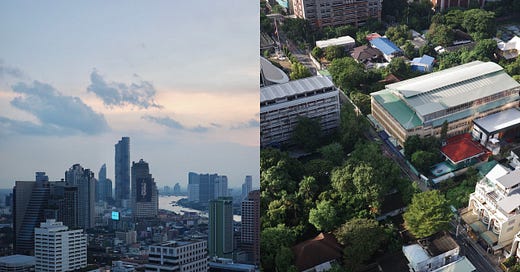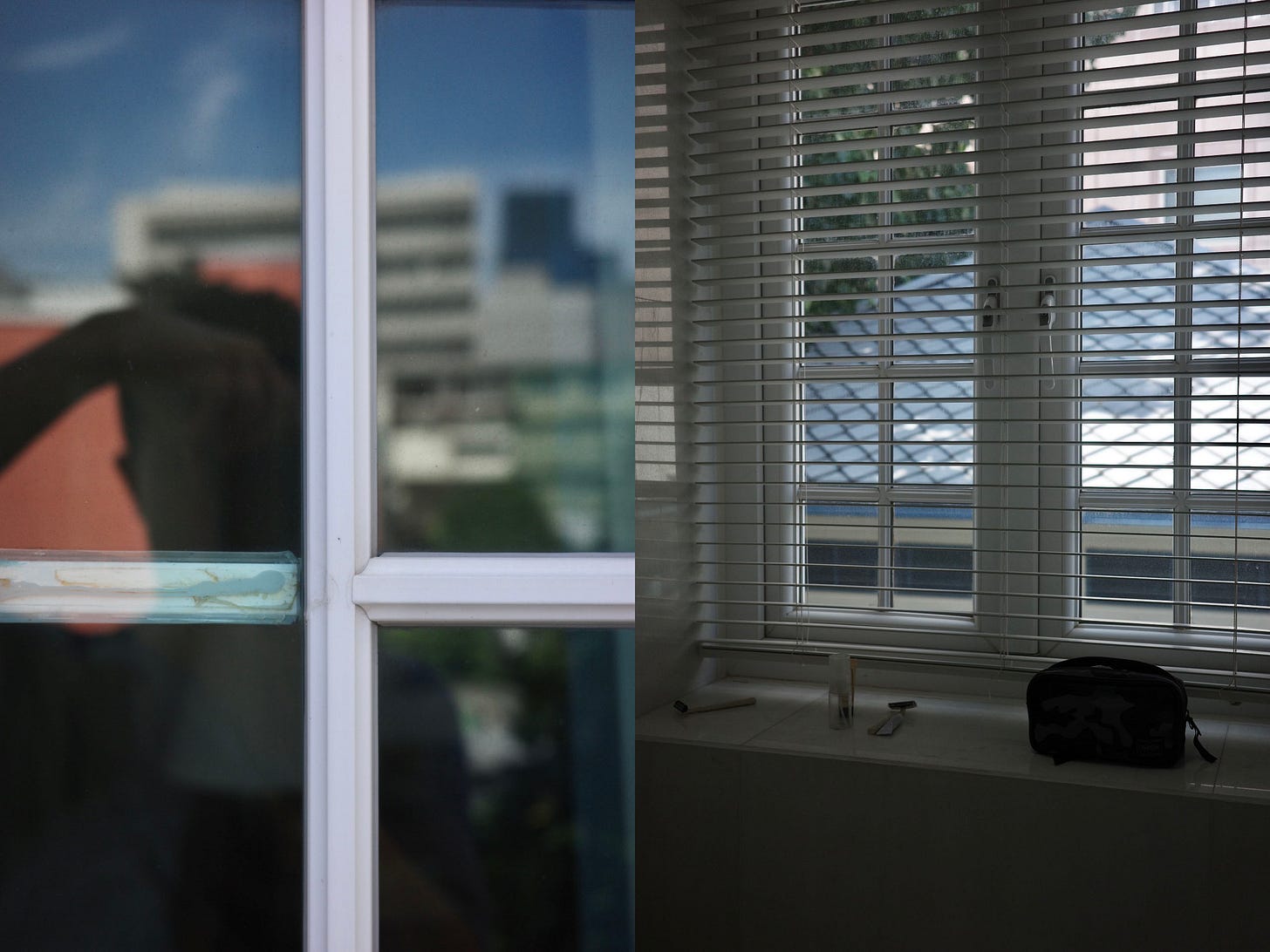The Riverside
I think of the freedom being in Bangkok gives me. The time to wander and observe, to be aimless.
We did laundry today.
The laundromat is tucked in an alley on Charoen Krung Road, across from the restaurant where we have been eating roasted duck noodles.
We needed to wash the bed linens we bought at Ikea for the new flat we will soon be moving into. Buying these things all over again. Things that one needs to live. And pots and pans, too, bowls and plates, cutleries, chopsticks, a pair of scissors, a bottle opener, baking trays, a dish-drying rack, a clothes-drying rack, a bucket, sponges and scrubs, cleaning products, cups and glasses, a mug, a vase, towels, a bath mat, rubber gloves, a spatula, and ladle. Things that we gave away and left behind before leaving Norwich. And Shanghai, of course.
They are only things, I had told myself. The less you have, the lighter you are.
I thought of my rice cooker. I lost one on the train when I first went to Norwich. Then I had a new one. When leaving Norwich, I left it for the neighbour in his shed before getting into the taxi. We simply couldn’t carry it. They are only things.
But it still hurt to let go of the rice cooker.
The washing cost 50 baht and would take 30 minutes, then the drying 60 baht and an additional hour. I love the idea of ‘waiting for your laundry’. There’s nothing to do but wait, a lovely way to justify aimless time. While the machine was spinning, we continued down the alley to Sarnies, a 19th-century shophouse-turned cafe. The place was expensive, for Bangkok standard, but it was busy; people come here for the ambiance as much as for the food and drinks, no? But how is it justified that a cup of coffee is more expensive than a bowl of fish ball noodles with fresh beansprouts and basil leaves? Shanghai used to be like this, too.
I love old shophouses, though. A yoga teacher I had taken classes with in Bangkok suggested I look for a place on the second floor of a shophouse to live in. Look in the areas closer to the river, she told me. A shophouse is a building that combines business and residence, with a shop on the ground floor and the family living upstairs on the first floor. They originated in China, but you rarely see them there now; they are common in southeast Asia. ‘Will there be signs put out to advertise them?’ I asked her. ‘No, you will just have to ask.’ I never found an upper floor of a shophouse for rent, but the idea of living in an old Chinese shophouse stirred much of my imagination.
I think of the freedom being in Bangkok gives me. The time to wander and observe, to be aimless, to think and to write. But most importantly, to explore life as it unfolds before me with no expectations. For once, I’m living in a city from which I want nothing. I do not strive to rebrand myself here, compete with anyone, or achieve any goal, or realise an ambition. I just take in every day as it comes. Like breathing, in and out, aimless.
With such lightness on my steps, G and I take our evening strolls after dinner, day after day. One evening, crossing Charoen Krung Road, we promenaded down the winding alley towards the Shangri-La Hotel. There were the Indian tailor shops, still open after eight; outside the countless massage parlours, middle-aged women who painted their faces white and lips red beckoned us in a soft chorus; across from them, motorbikes parked under a flood of white streetlight outside the iron gate of an ancient temple.
The Shangri-La is an old five-star hotel. Ten years ago, when I worked for James Cohan Gallery in Shanghai, a client held a New Year’s party in one of its suites where I, among her other guests, watched fireworks blossoming over the river. In my twenties and staying in budget hotels, I always said one day I wanted to stay at the Shangri-La by the river. But I never did, because later it seemed dated to my taste, and in Bangkok, there’s always something newer, brighter, and more sleek. We took the stairs down to the lower level where the pool has a resort vibe and the outdoor restaurant is right by the water, and from there, to the pier. Luxury hotels dot either side of the Chao Phraya River, and each riverside hotel has its own boat, which ferries guests back and forth between the hotel and IconSiam, Bangkok’s latest addition of luxury shopping mall, from morning till night.
We watched the waves lapping against the pier and large fish making appearances every few seconds. They are mysterious, ferocious and beastly-looking, the kind that has teeth and would bite. There must be even bigger fish and creatures underneath. You don’t want to imagine yourself falling into this wide, deep, murky river.
A long-tail boat came. An old white man and a young Thai woman in a red evening dress stepped on. I tried not to stare. The scene is not uncommon, only that the image of the red dress and white hair and night river-crossing is more lingering than that of the baggy pants of a fat middle-aged white man and the black tank top of an aging Thai woman. And it could be a Thai man, too. But of course, there is no difference.
Another evening, we took a different direction along Charoen Krung Road to go up the river. I wanted to see the Assumption Catholic Cathedral I saw on the map, but for some reason, we didn’t find it and ended up going inside the Mandarin Hotel next to where the cathedral is supposed to be. Compared to the Shangri-La, the Mandarin seemed much newer, ritzier and more sumptuous. Passing through a corridor of a jazz bar, cigar lounge and restaurant, I felt that the night was flowing like water. At the hotel pier, I asked what time the next boat was leaving. ‘Where are you going?’ the hotel staff in a suit asked. ‘IconSiam.’ ‘In two minutes,’ he said, and pointed at the long-tail boat approaching the pier.
‘The boat is for hotel guests,’ G said. ‘They are going to ask for our room number!’
‘They won’t. Don’t worry.’
The man didn’t ask a thing. They never do. ‘Happy shopping,’ he said. In Bangkok, hotel staff rarely question guests, or farangs – foreigners – who look like guests. In the case of a dispute, the language barrier makes things too complicated for them; it is ironic that in their own country, the ones without enough English are the ones with no language. The boat left the pier. Floating on the water, we were surrounded by lights from hotels on either side of the river. ‘You want a photo?’ A staff pointed at us both and the seats at the stern. ‘Yes! Why not?’ I felt as if on holiday. It is easy to be an imposter in this city. I couldn’t help wondering if that is what I am, not only posing as a guest so as to be on a hotel boat but also in life and in everything I do.
In just minutes we were approaching the other side. At the edge of the water, IconSiam beamed and glittered with its gold and lights and luxury brand windows like a sun in the night. We walked past the tourists on the promenade and around the music fountain and went inside. Having been here before, I was still struck by its enormity, superfluousness and materialistic abundance. A consumer’s Emerald City.
After picking through slippers and electric fans and hugging cushions at the Muji store, we took the same boat back to the Mandarin. The Mandarin Oriental Bangkok was originally The Oriental Hotel, the first luxury hotel in Thailand (when it was called Siam), opened in 1887. But you wouldn’t know it unless you come to the hotel by boat because you will only see the sign of its old name when the boat is approaching the pier.
Passing through the same white-marbled corridor towards the lobby, two Thai women, perhaps mother and daughter, were discussing something intently. They were both formally dressed in extravagant evening gowns and their hair thick clouds on top of their heads. They seemed to have stepped out of a party because of some unexpected interruption. In Shanghai, people like to use the term ‘old money’ to refer to a certain style of home decor, fashion and way of living, but no one is from ‘old money’ in China. The ‘old-money’ Chinese are overseas, in New York, London, Hong Kong, Singapore and Bangkok. I smelt a whiff of cigar before we turned into the palatial lobby.
A doorman held a door open for us, completely unaware that we had been there just for a free boat ride. ‘Have a good night, Sir,’ he said. ‘Thank you,’ I said in the formal and grownup voice I use in a place like this, and stepped into the night.






Thank you for sharing Bangkok from your unique perspective! I love how you immediately picked up how to score a free boat ride so soon in your stay. :)
Bangkok really is a rewarding city for the flaneur. The Thais really have a way of absorbing the cultures they've come into contact with, putting their own spin on it, and coming up with something radically different yet intimately familiar. Or, as the meme says, "same same but different."